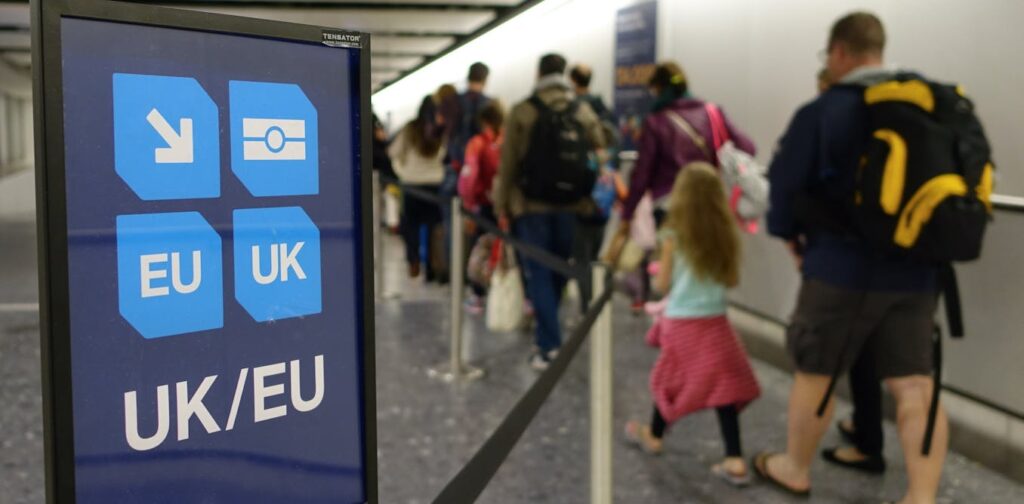The government has announced a series of new restrictions aimed at reducing net migration to the UK. Key announcements include increasing the salary requirement for skilled foreign workers from £26,200 to £38,700, and banning health and care workers from bringing their dependents to the UK.
The fine print will see the Minimum Income Requirement (MIR) for family visas double to £38,700, meaning many Britons will no longer be able to bring their non-British spouses or partners to the UK – a move that, if implemented, could result in the separation of thousands of couples, parents and children.
The UK already has one of the second-strictest family immigration regimes in Europe, if not the world. The MIR was first introduced into UK immigration rules in 2012, at £18,600 per year. At the time, this amount was higher than the income of 47% of the UK adult population as a whole, and even higher for women, young people, some ethnic groups and those living outside South East England.
The impact on families has been devastating: by 2015 an estimated 15,000 children were affected because their families were unable to meet the requirements for reunification in the UK. Foreign parents were left behind overseas (with or without children) and thousands of children were separated from their parents.
Average wages have since risen, but problems remain: The requirement is a minimum, and it must be higher if the application includes children. Applicants must prove they have been earning this salary for at least six months, meaning that people who only recently reached the threshold (because of a new job or promotion) still have to wait many months before their families can join them.
There is an alternative to meeting the financial requirement through cash savings, but at £62,500 this is prohibitive.
As recently as February 2023, a House of Lords inquiry criticised the family immigration system for being “inconsistent with the government's commitment to family life”. The inquiry recommended making income requirements more flexible and advised against increasing them.
Who does this affect?
The average salary for a full-time UK employee is £34,963, meaning more than half would not meet the new standard. Those aged 22-29, when most relationships are formed, earn even less: £30,328 for men and £27,937 for women.
Wages for some key professions are much lower. Carers and home care workers have an average wage of £23,409. Migrant carers are exempt from the new salary thresholds, but carers who are British citizens (or long-term residents) cannot apply to bring their family to the UK.
The government argues that the new requirements will ensure that people bringing dependants to the UK can financially support them, but unlike in 2012, the Migration Advisory Committee – a body of experts set up by the government to advise on immigration issues – has not been asked to prove this claim.

Mundissima/Shutterstock
This argument makes little sense for people who cannot work full time because of child care or other responsibilities, who do not have a partner to share financial and child care responsibilities, and who are forced to live alone or as a single parent.
We have carried out extensive research with families and couples separated by the UK immigration system. One of our participants, Sophia, and her husband, were living abroad but agreed to emigrate to the UK due to political instability in her husband's country. However, due to minimum income requirements, she had to come with just her daughter.
Sophia found herself caught between her children's needs, the deep grief caused by her separation from her father, and the long hours of work required to meet the standards.The new MIR would have very likely made their separation permanent.
The raised standards are staggering and will be a major blow to people hoping to reunite their families: Just when you think you've finally secured the child care and job you need to bring your partner over, imagine what would happen if the goalposts were not just raised slightly, but raised beyond the earning capacity of most people.
Separating Families
Mixed-nationality couples are common in “global” Britain: in the year to September 2023, 65,278 people were granted visas to marry a British partner. One in 25 married or cohabiting couples in the UK has one partner born in the UK and one born in the EU.
UK-EU couples will now be subject to the immigration system and will be among the many people affected by the new requirements. Our Brexit Couples project explores the experiences of these couples, revealing their anguish, delays, costs and frustrations with the UK immigration system. As one respondent put it, “It feels like some kind of economic unfairness that basically only the rich can do.”
The new rules will be a devastating blow to British citizens who fall in love with foreign partners, and it is difficult to predict how many people will be affected.
Many will not apply (especially after the recent tuition fee hikes) and will either emigrate abroad or endure indefinite separation. Those who can afford it will appeal the refusal on human rights grounds; they will likely be successful, but at greater expense and with further extended separation from their families.
The political fallout is also unpredictable. More people will become aware of the strict family migration rules when they or a loved one are affected. The proposal may end up being less popular than the government hopes.

